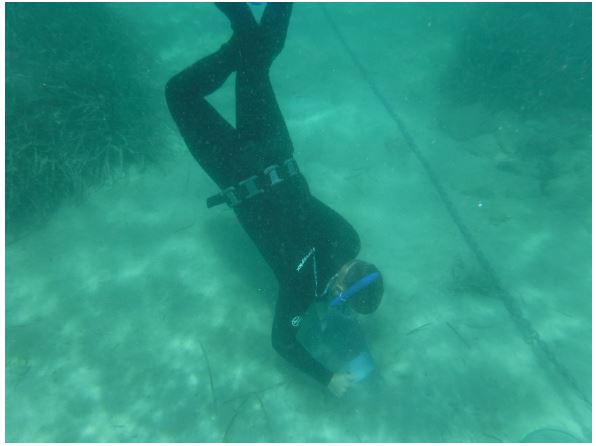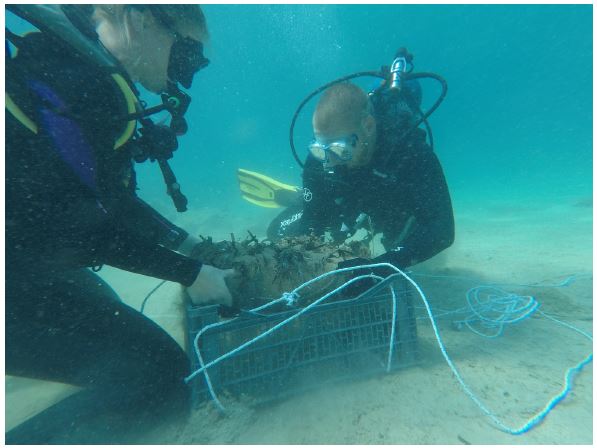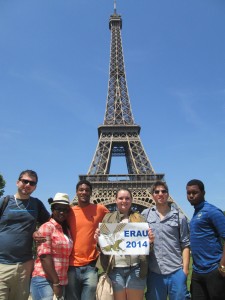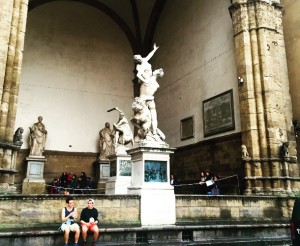by guest blogger and student John Marbut
Going to Europe for an extended stay can be a bit intimidating at first, there are a lot of things to take care of. Hopefully this will answer some of your questions and get everything set up.

Kloster Andechs
Study Abroad Scholarships:
Well there are several options for scholarships to Germany, these include CBYX, UAS7 (they offer a one semester and two semester trip), and fulbright.de. There are also program specific offers from various universities. I went to Germany on the UAS7 SIP program for two semesters, one semester studying in Munich and one semester working on a project in Bremen.
How much does it cost?
For a year a safe bet would be around $13-14k and would give you cash for traveling around Europe. There is no tuition at German universities, but there is a small semester fee that covers the local transport ticket. If you are staying in Munich and aren’t able to get into the Studentenwerk you will have to plan to spend more on rent.

Munich Olympic Park
What about housing?
If possible try to get in with the school’s studentenwerk, they usually offer a dorm style setup with a private bedroom. There are also cheap bars built into the student housing, these tend to be great places to hang out or party with your friends. The rent is very reasonable and you won’t have to worry about supplying a lot of things. If you aren’t able to get a room with the studentenwerk I would recommend checking http://www.wg-gesucht.de/en/ it is the most popular rental listing site in Germany. Please do be aware that there are scam artists that use the site and you should never agree to mail a deposit and wait for a key. Also the housing market moves very quickly in Germany, listings generally last less than a week if it is a good deal.
Do I need any special paperwork?
I would strongly recommend carrying your acceptance paperwork on you when you arrive in the country, this will make getting through customs easier. Also after arriving at your residence you are required by law to go to the Burgerburo or Burgerservicecenter to register your address within two weeks of moving. Additionally within 90 days of arriving in Germany you will need to get a residence permit, the somewhat tricky part is proving that you have funding. The German legal system expects you to be able to show that you have about €750 for every month you plan on living in Germany to cover the cost of living. You will also need your university paperwork that has your immatrikulationnummer on it and proof of health insurance. The permit costs around €60.
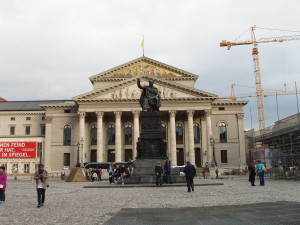
Marienplatz in MUnich
Health insurance?
Everyone in the EU is required to have health insurance, Germany has state run health insurance companies that offer full coverage for about €80 per month. If you have health insurance in the US you may be able to waive the requirement by providing documentation on your coverage. The health insurance is required for your enrollment in the university and they usually have some one from the insurance companies at the enrollment.
What are the classes like?
German courses are structured very differently than US courses, in Germany the lectures can be optional. Most classes give you a “script” which is a compilation of notes for the class, this can include worked problems. A textbook will probably cost you €10-50, but there will probably be a copyright notice stating that it can’t be imported to the US. Additionally there are no homework assignments or midterms, the entire course grade rests on the final exam. Don’t forget to register for your final, otherwise you won’t be given a grade. There is usually another form that you need to fill out to send your report card to Embry-Riddle.

Munich Olympic Park
How easy is it to get around?
It’s incredibly easy, Germany and most of Europe have a very well developed system of public transportation. In Munich there are buses, trams, and subways that will take you to just about any part of the city. There is also uber if you are out and the buses/trams/trains stop running. I would suggest that you bring leather shoes though as you will probably be doing a lot of walking and its cheaper to resole a leather shoe than to buy a new pair of shoes every 5-6 months. I would also recommend that you carry a messenger bag with a bottle of water, shopping tote, and an umbrella. It makes wandering around much more simple and most fast food/smaller restaurants are ok with you bringing your own drink, especially since they won’t serve you tap water.
Any hints?
The big one is to check with your bank on their international fees. The last thing you want is to be stuck Germany paying $5 + 5% of the withdrawal + 1% Visa fee every time you take out cash. Germany, and much of Europe, is cash based so expect to take out cash regularly.
Stick to prepaid sim cards, the standard contract is 2 years and in order to break it you have to submit a handful of paperwork and a letter explaining why you are breaking the contract. Prepaid plans are about €10 a month and can be adjusted to include data for foreign countries relatively easily, which is great for traveling.
Buy a universal powerstrip! They use a different type of outlet here and that is the best way to keep from having to buy a bunch of converters.
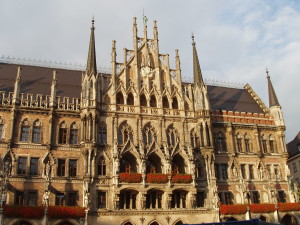
Marienplatz in Munich
Check your electronics, here they use 220 volts at 50 hz instead of the 110 volts at 60 hz that is used in the US. If your charger or device has 110-220 50-60 on the power supply then you should be in good shape.
Consider bringing a wireless router. Not all rentals offer wifi, and it beats using a cable.
Before you leave install the textfree app, it gives you a US number and lets you place calls and text from a US number. Since it uses wifi its a good cheap option to stay in contact.
Learn your German numbers, it makes checking out a lot easier.
When you go shopping, don’t forget your bags. You have to bag your own things, and you will have to buy bags if you forget yours.
If you like to travel get a Bahn card, you can get 25-100% off of train fares through the Deutsche Bahn. They also have regional specials that let you travel for reduced prices.
Keep your options open when you travel, there are a lot of options flixbus, megabus, Deutsche Bahn, Ryanair, and eurorails are all good ways to get around.
-John Marbut

Neueschwanstein

Neueschwanstein

Neueschwanstein
